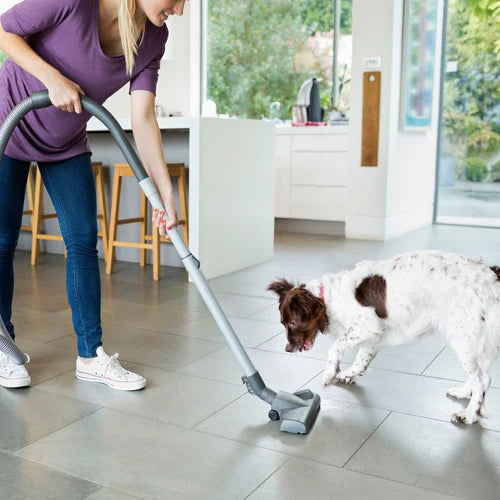Dog Science Series: Why Are Dogs Afraid of Vacuum Cleaners?

Many dogs are naturally afraid of vacuums, just like they may be afraid of thunderstorms. The machine makes a high-frequency noise that can hurt your dog's ears or cause significant distress. Keep in mind that dogs can hear at much higher pitches than the average human ear, which can increase that fear. Over time, even the presence of the vacuum when it is turned off and making no sound can induce your dog to bark.
You wonder, "Why is my dog afraid of the vacuum?" Are you looking for strategies that will help you vacuum in peace? You can just read on to learn more.
Why are Dogs Afraid of Vacuum Cleaners?
Not all dogs are afraid of vacuum cleaners. However, many dogs are fearful or distressed when the vacuum comes out. Pet parents may quickly notice that their dog's body language changes when the vacuum comes out. They may start lunging, barking, or other changes in their dog's behavior.
There are several reasons why the vacuum may cause fear.
Your dog has a negative association with the vacuum cleaner.
Sometimes, your dog may develop a negative association because of a bad experience with the vacuum cleaner. Your dog may, for example, have experienced someone using the movement of the vacuum to scare them, or they may have experienced a lot of high-pitched noise due to a loud or damaged vacuum, which can be harmful to the dog's ears.
Your dog struggles with the loud noise associated with the vacuum.
Vacuum cleaners can hit very high decibels, hurting your dog's ears and leaving them whining or cowering. In addition, a dog who is more sound-sensitive than others may have a more challenging time dealing with the vacuum than a dog who does not have that high hearing sensitivity.
Your dog has had a negative experience with a past vacuum cleaner.
A Roomba, for example, might have tried to vacuum up your dog's tail or caught on the dog's fur. If your dog has had a genuinely negative or painful experience with the vacuum, it may increase the odds that your pet will respond negatively when the vacuum cleaner comes out.
What Can You Do if Your Dog is Scared of the Vacuum Cleaner?
If your dog is afraid of the vacuum cleaner, there are several steps you can take to create a more positive association and make it easier to vacuum even when your dog is at home.
1. Do not punish your dog for reacting to the vacuum cleaner.
Remember that an adverse reaction, including growling or snapping, is rooted in a fear response. Do not punish your dog for that reaction. Instead, give your dog space from the vacuum at first. You may want to keep the vacuum in another part of the house until you are ready to start training.
2. Introduce your dog to the vacuum cleaner while it is turned off and making no noise.
Keep it still, and do not introduce any movement. Instead, allow your dog to sniff and get used to the vacuum. You can even try setting it next to their dog bed, crate, or favorite pillow.
3. Move the vacuum cleaner gradually and carefully without plugging it in.
Consider offering your dog treats from a distance that is comfortable for your pet. For example, you may want to use popular dog food, peanut butter, or pet treats. As a pet owner, you know best what will likely help your dog respond positively to the vacuum cleaner.
Over time, allow your dog to get closer to the vacuum cleaner while you push it around. Please continue to keep it turned off to avoid the fear response.
4. Turn the vacuum cleaner on once your dog becomes more comfortable moving it around the house.
It can be helpful to have someone else with you when you're ready to turn the vacuum cleaner on for the first time. First, make sure your dog is far from the vacuum and distracted. Then, turn the vacuum cleaner on. You want to be far enough away that your dog will react calmly to the vacuum cleaner rather than panicking. When your dog responds calmly, offer lots of treats and praise. Over time, you can continue to get the vacuum cleaner closer.
5. To avoid further fear of vacuums, never indulge in negative or teasing behavior with the vacuum cleaner.
A fear of vacuums will often develop because of an adverse event: chasing the dog with the vacuum or allowing a child to try to vacuum the dog's toes or fur while playing. Even an even-tempered dog may have difficulty dealing with those fear-inducing stimuli. So instead, make using the vacuum cleaner a fun and positive experience for your dog.
Dealing with a fear of vacuum cleaners can be incredibly frustrating. Fortunately, dog owners can use these strategies to help reduce that fear and make their pets more comfortable. Are you looking for other methods to help your pet live a more luxurious life? Contact us to learn more about our range of products.
FAQ
Do all dogs hate vacuum cleaners?
Not all dogs hate vacuum cleaners. Many, however, are sensitive to loud noises like the vacuum sound. So you may need to work with your dog over time to overcome that fear.
How do I get my dog to stop barking at the vacuum cleaner?
You may need to train your dog to stop fearing the vacuum cleaner carefully. Desensitizing your dog carefully over time, as part of a multi-step process, can make overcoming your dog's fear easier.
Is it okay to vacuum if it's scaring your dog?
You may not have a choice about taking care of the vacuuming around your house, even if it scares your dog. After all, you have pet hair to clean up! So go ahead and vacuum, but try to put your dog in a safe place away from the vacuum cleaner to make the process easier on everyone in the family.
1 comment
Subscribe
Sign up to get the latest on sales, new releases and more…
Categories
- Best Places to Take Your Dog on Vacation this 2026(USA Edition)
- Tails of Celebration: Working Dogs of the Lares Trek, A Silent Partnership In Peru
- 5 Easy Organic Christmas Recipes for Dogs: Simple Holiday Treats Your Companion Will Love
- The 6 Best Luxury Gifts for Your Dog This Christmas: Thoughtful Holiday Comfort That Truly Lasts
- Why Playtime Matters: The Benefits of Mental Stimulation and Playtime with Your Companion
- Tails of Celebration: The Miao Dog-Carrying Festival - A Hero's Honor in China
- A Dog-Friendly Thanksgiving 2025: Comfort, Calm, and Easy Treat Recipes
- The Best Dog Beds for Winter 2025: 5 Luxury Styles for Warmth, Comfort & Orthopedic Support
- Tails of Celebration: The Feast of Saint Hubert — Belgium's Timeless Blessing
- Halloween Safety Tips for Dogs: How to Keep Your Companion Safe This Spooky season
- Tails of Celebration: Día de los Muertos / Day of the Dead for Pets, A Festival of Memory in Mexico
- How to Care for Senior Dogs in Fall: Mobility Tips & Joint Support
- Tails of Celebration: Kukur Tihar & The Tihar Festival of Nepal
- What is a VDI Testing for dogs ? : Insights, Procedures and Preventive Measures
- Cheap Dog Beds vs. Luxury Dog Beds: The Real Cost of a $50 "Disposable" Dog Bed
- Can Dogs Have OCD? Understanding Canine Compulsive Behaviors (CCD)
- Does My Dog Like Music? Find Out What Tunes Make Your Pup Wag!
- Effective Solutions for Food Aggression in Dogs
- 7 Frozen Treats Your Dog Will Love This Summer☀️🧊🍉
- The Best Waterproof Liners for Dog Beds: Protect Against Spills, Drool, and Accidents
- How to Cope with the Loss of a Dog: A Tribute to Every Companion We Carry in Our Hearts
- Top Tips on How to Prevent Matting in Dogs
- Understanding and Managing Dogs with Hip Dysplasia
- The Ultimate Guide to Dog Gut Health: Natural Remedies, Probiotic Insights and Signs of Poor Gut Health
- The Best Supplements for Dogs: Explore Top Picks for Canine Health and Wellness
- How Often Should I Brush My Dog's Teeth? Tips for Optimal Canine Dental Health
- Ultimate Guide on How to Comfort Your Dog During Fireworks this 4th of July
- Managing a Blowing Coat: Essential Grooming Tips for Double-Coated Dogs.
- 5 Daily Habits That Boost Your Dog’s Long-Term Wellness
- Mastering Crate Training a Dog: Tips and Benefits
- Dog Car Seats vs. Seat Covers: What’s The Best Option For Your Companion?
- Best Outdoor Dog Beds: Luxury, Durability, and Unmatched Comfort
- Is My Dog Overweight? Tips to Assess and Help Your Companion
- The Best Faux Fur Dog Beds for Ultimate Pet Comfort of 2025
- Dog Running Guide: How to Start, Train & Stay Safe when running with your Dog
- Indestructible Dog Beds? The Truth Behind the Term
- Top Tips for Effective Exercise for Dogs
- Effective Dog Ear Cleaning: A Step-by-Step Guide for Maintaining Healthy Ears
- How to Manage Dog Aggressive Behaviors: Expert Tips and Advice
- Effective Canine Ear Infection Remedies: Symptoms, Causes & Treatments
- How to Make a New Dog Comfortable in Their New Home - 2025 Guide
- Signs of Dog Allergy Symptoms and How to Help and Prevent Them
- Why Does My Dog Lick Their Paws? Causes and Solutions Explained
- Dog Alzheimer's: Symptoms, Causes, and Treatment Options
- The Legacy of Comfort with the Iconic Animals Matter® Ortho Companion-Pedic® Puff Luxury Dog Bed
- Orthopedic Square Dog Beds: The Ultimate Blend of Luxury, Comfort, and Support
- Loungers: The Ultimate Beds for Luxury, Comfort, and Orthopedic Support
- Square Dog Beds: Orthopedic Comfort and Stylish Designs for Your Companion
- Effective Solutions for Canine Incontinence: Identifying Causes and Best Treatments
- Ethical, Sustainable, and Certified: Why Certified Products Matter, Exploring CA Prop 65 and CertiPUR-US® Standards


Thank you that was helpful I’ve only had dog for three days he was always out side in all weathers he’s two years old never bean in doors before it’s the first time he’s been indoors and he’s very nervious I’ve got a lot of work to do with him thank you for your information I will do that
Leave a comment
Please note, comments must be approved before they are published